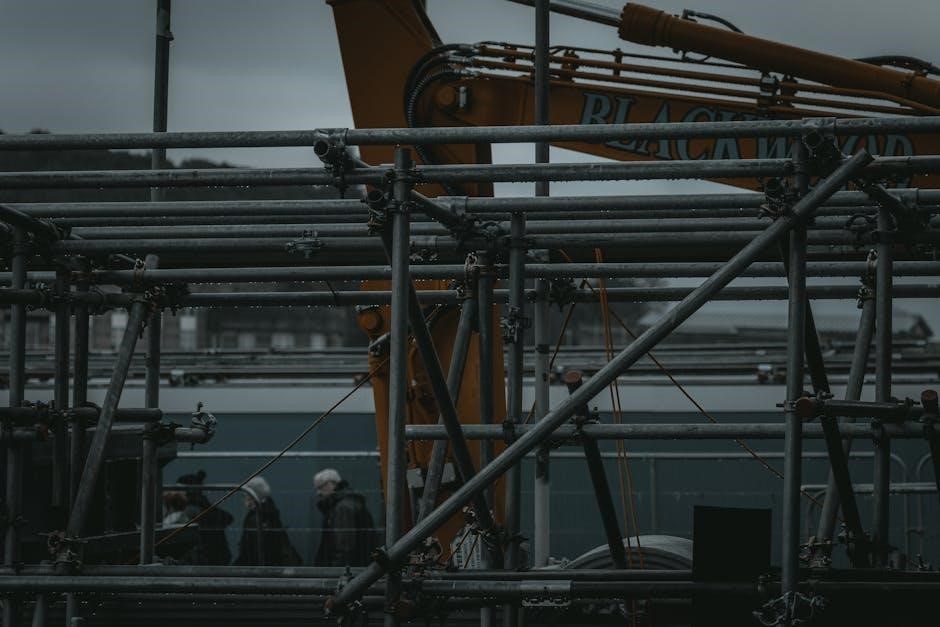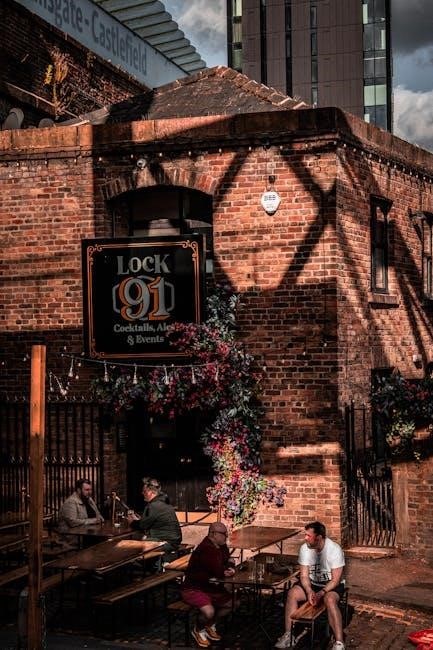Manual to automatic transmission conversion in the UK is gaining popularity, offering smoother driving experiences and reduced driver fatigue, especially in urban areas, with costs varying widely.
Overview of Transmission Conversion
Transmission conversion involves replacing a manual gearbox with an automatic system, requiring mechanical expertise and specialized tools. The process includes removing the manual clutch, installing an automatic transmission, and adapting engine mounts. Additional components like sensors and wiring may be needed for proper functionality. Costs vary depending on vehicle type, transmission model, and labour rates. UK drivers increasingly opt for automatics due to urban driving convenience, though the conversion’s complexity and expense must be carefully considered.
Importance of Understanding Conversion Costs
Understanding manual to automatic conversion costs in the UK is crucial for budgeting and avoiding financial surprises. Prices vary widely based on vehicle type, transmission model, and labour rates, ranging from £2,000 to £10,000 or more. Additional expenses for engine mounts, wiring, and custom work can arise, increasing the total cost. Long-term maintenance and potential insurance changes should also be considered. Proper planning helps ensure the conversion aligns with financial capabilities and expected benefits, making the investment worthwhile.
Why Convert to Automatic Transmission?
Converting to automatic offers enhanced driving convenience, smoother urban experiences, and reduced driver fatigue, aligning with the growing UK trend toward automatic vehicles for ease and comfort.
Benefits of Automatic Transmission
Automatic transmissions offer a smoother and more convenient driving experience, reducing driver fatigue, especially in heavy traffic. They eliminate the need for manual gear shifting, making urban driving easier. Automatics are ideal for new drivers or those who prefer a hassle-free commute. Additionally, they often provide better fuel efficiency in stop-and-go conditions and require less mechanical input, enhancing overall comfort and control behind the wheel.
Driving Experience and Convenience
Converting to an automatic transmission significantly enhances driving convenience, particularly in urban areas with heavy traffic. Automatics eliminate the need for constant gear shifting, reducing driver fatigue and stress. This makes long commutes more comfortable and allows drivers to focus better on the road. Additionally, automatic transmissions are ideal for new or inexperienced drivers, as they simplify the driving process. The seamless gear transitions also provide a smoother overall driving experience, making it a practical choice for modern motorists in the UK.

Cost Implications of Manual to Automatic Conversion
Manual to automatic conversion costs in the UK vary widely, ranging from £250 to £2,500, depending on the vehicle and transmission type, with parts and labor affecting the total cost.
Parts and Labour Costs
Parts and labour costs for manual to automatic conversion in the UK vary significantly, with prices ranging from £250 to £2,500. The cost depends on the vehicle type, transmission model, and custom requirements. Bespoke ECU coding, CNC-machined parts, and specialist tools can increase expenses. Labour rates typically range from £60 to £100 per hour, with the process often requiring 40 to 100 hours of work. Additional costs may include sourcing rare or custom components, further impacting the total expenditure.
Estimated Total Cost in the UK
The estimated total cost for a manual to automatic transmission conversion in the UK ranges from £250 to £2,500, depending on the vehicle and transmission type. Basic conversions may start at £250, while complex swaps, including bespoke ECU coding and custom parts, can exceed £2,500. Factors such as the vehicle’s make, model, and year significantly influence the final cost. Additional expenses for specialised tools or rare components can further increase the total expenditure.
Conversion Process and Requirements
A manual to automatic conversion in the UK involves assessing the vehicle, adjusting the ECU, and installing the transmission system. Expertise and specialized tools are essential for a smooth process.
Pre-Conversion Checks
Before converting a manual to automatic transmission, it is crucial to assess the vehicle’s compatibility and condition. This includes evaluating the engine, gearbox, and electrical systems. Consulting with specialists ensures the conversion aligns with the vehicle’s specifications. Additionally, checking for any existing mechanical issues is essential to avoid post-conversion complications. Proper pre-conversion checks help determine the feasibility and potential costs of the process, ensuring a smooth and successful transition to an automatic transmission system.
Steps Involved in the Conversion
The conversion process begins with removing the manual gearbox and clutch, followed by installing an automatic transmission. The gearshift and clutch pedal are replaced with an automatic shifter. Electrical systems, including the ECU, are reconfigured to support automatic functionality. Wiring harnesses and sensors may need adjustments. Hydraulic lines and mounts are also updated. The process requires precision to ensure compatibility and functionality, often involving specialized tools and expertise to complete successfully.
Post-Conversion Testing
After the conversion, thorough testing is essential to ensure the automatic transmission functions correctly. A road test is conducted to check smooth gear shifts, acceleration, and braking performance. The transmission fluid level and condition are verified, and any leaks are inspected. Electrical systems, including the ECU, are tested for proper communication with the new automatic gearbox. Additional checks include ensuring the torque converter engages correctly and that there are no unusual noises or vibrations. This step ensures reliability and safety post-conversion.

Legal and Safety Considerations
Manual to automatic conversion in the UK must comply with DVSA regulations, ensuring roadworthiness and safety standards are met to avoid legal issues and ensure proper functionality.
UK Regulations for Transmission Conversion
Transmission conversions in the UK must comply with DVSA regulations, ensuring the vehicle meets roadworthiness standards. Conversions require notification to the DVLA and may need an MOT test post-conversion. Additionally, any modifications must not compromise safety or emissions standards, and some conversions may require engineering certificates. It’s essential to consult with certified professionals to ensure compliance with all legal requirements and avoid potential fines or legal consequences.
Safety Standards and Compliance
Safety is paramount in manual to automatic transmission conversions. All modifications must meet strict UK road safety standards, ensuring the vehicle remains roadworthy. The conversion process requires certified parts and professional installation to prevent mechanical failures. Compliance with UK regulations is non-negotiable, as non-compliant vehicles can fail MOT tests or be deemed unsafe. Always consult a certified specialist to ensure safety and avoid legal repercussions, guaranteeing your vehicle operates safely and efficiently post-conversion;
Maintenance and Insurance
Maintenance and insurance considerations after a manual to automatic conversion in the UK can vary. Automatic transmissions may require less frequent maintenance, potentially lowering costs. Insurance premiums could increase due to the higher value of the converted vehicle.
Long-Term Maintenance Costs
Long-term maintenance costs for automatic transmissions in the UK can vary depending on the vehicle and usage. While automatics may require less frequent manual clutch replacements, components like torque converters and solenoids can be costly to replace. Regular fluid changes and filter replacements are essential to maintain optimal performance. Additionally, high-mileage vehicles may experience wear on the transmission’s internal components, leading to higher maintenance costs over time. Balancing these factors is crucial for long-term financial planning.
Insurance Implications
Converting to an automatic transmission in the UK can have insurance implications. Automatic vehicles often incur higher insurance premiums due to their complexity and cost of repairs. Insurers may view automatic transmissions as less engaging for drivers, potentially increasing rates. Additionally, modified vehicles, including those with transmission conversions, may face higher premiums or require specialized insurance policies. It is essential to consult with insurers before and after the conversion to understand potential changes in coverage and costs.

Common Mistakes to Avoid
Improper planning and budgeting are common mistakes. Many overlook the complexity of the process and fail to consult professionals, leading to unexpected costs and delays.
Planning and Budgeting Errors
Many individuals underestimate the total cost of manual to automatic conversion, leading to financial strain. Labour costs, parts, and unforeseen expenses often exceed initial estimates. Budgeting without professional consultation can result in overspending. Additionally, some owners fail to account for long-term maintenance and insurance changes. Incorrectly assessing the complexity of the conversion process can also lead to project delays. Proper research and expert advice are essential to avoid these common pitfalls and ensure a smooth transition.
Technical and Mechanical Oversights
Common errors include incorrect installation of automatic transmission components, such as the torque converter or solenoid pack, which can lead to system malfunctions. Many overlook the need for custom ECU tuning to ensure compatibility with the new transmission. Additionally, compatibility issues with existing engine mounts, wiring, and clutch systems often arise. Improper alignment of the driveshaft and gearbox can cause vibrations and premature wear. These oversights highlight the importance of precise technical execution and professional expertise during the conversion process.
Future Trends in Transmission Technology
The automotive industry is shifting toward electric vehicles and advanced automatic transmissions, potentially reducing demand for manual-to-automatic conversions as smoother, more efficient systems become standard.
Advancements in Automatic Transmissions
Recent advancements in automatic transmissions include improved dual-clutch systems and refined torque converters, offering smoother gear shifts and better fuel efficiency. Manufacturers are also integrating AI-driven adaptive systems to optimize performance based on driving conditions. These innovations, coupled with the rise of electric vehicles, are reducing the need for manual-to-automatic conversions as modern automatics become increasingly sophisticated and cost-effective. Such technological strides are shaping the future of automotive transmissions in the UK and globally.
Impact of Electric Vehicles
The rise of electric vehicles (EVs) is reshaping the automotive landscape, influencing the demand for manual-to-automatic transmission conversions. As EVs gain popularity, their automatic-like drivetrains are reducing the need for traditional transmission swaps. With many new EVs offering seamless, single-speed or dual-speed systems, drivers are gravitating toward their simplicity and efficiency. This shift is expected to reduce the cost and appeal of manual-to-automatic conversions, especially as EV adoption grows in the UK and globally.

Frequently Asked Questions
Is manual to automatic conversion costly in the UK? Yes, with prices ranging from £8,000 to £10,000, depending on the vehicle type and labour costs involved.
Is Conversion Worth the Cost?
Converting a manual to an automatic transmission in the UK can be costly, with prices ranging from £8,000 to £10,000, depending on the vehicle and specific requirements. While some drivers find the convenience and reduced fatigue worth the investment, others may not, especially if the vehicle is older or less frequently used. The decision ultimately depends on personal driving habits, budget, and long-term benefits, as the conversion may not always increase the car’s resale value.

How Long Does the Conversion Take?
Converting a manual to an automatic transmission typically takes 2-4 weeks, depending on the complexity of the job and the workshop’s workload. Simple conversions may be completed faster, while complex cases, such as custom setups or additional mechanical adjustments, may require more time. A pre-conversion inspection is often needed to assess the vehicle’s condition, and delays can occur if rare parts are required. Plan accordingly, as specialist services may also have waiting lists.
Manual to automatic conversion in the UK offers enhanced convenience and driving comfort, though costs vary widely based on labour, parts, and vehicle specifics. Plan carefully.
Final Thoughts on Manual to Automatic Conversion
Converting a manual to automatic transmission in the UK is a personal choice, balancing convenience, cost, and driving preferences. With prices ranging from £2,000 to £10,000, depending on the vehicle and specifics, careful planning is essential. The shift toward automatics reflects modern driving habits, especially in urban areas. Weighing long-term benefits against initial costs and vehicle suitability is crucial for a satisfactory outcome. Consulting specialists ensures a smooth and tailored conversion process.
